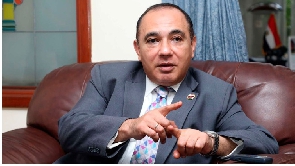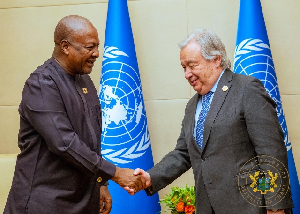The Egyptian government says it won't consider opening its borders to Gaza refugees because it won't offer a solution to the ongoing conflict. Instead, Egyptian Ambassador to Kenya Wael Nasr Eldin Attiya says Cairo is pushing for a ceasefire and the resumption of negotiations to resolve a conflict that has lasted more than seven decades.
In an interview with Nation.Africa on Tuesday, Attiya argued that the uncertainties surrounding Israel's war with Hamas, coupled with the possible infiltration of militants among the fleeing refugees, made it untenable to accept refugees.
“The problem with that is, first of all, how do we know that whoever is coming into Egypt is just a civilian? How do we know that they could not be infiltrated by Hamas? And if they stay there, how do we know [how long] the Israeli operations in Gaza [will last]?” Mr Attiya posed in Nairobi.
“Israeli officials are saying the operations might take long. So, how long? It could be months; it could be years. Some estimates actually within Israel go as far as 18 months.
“So, if Egypt takes in these people for 18 months and it turns out some Hamas infiltrated into Egypt and they start to launch attacks into Israel from their new locations, then Israel will again claim that it has the right to defend itself and then it would attack Egypt.”
Israel and Hamas, the militants who run Gaza, have been at war since October 7, when the militants attacked Israel. Israel has since responded with the utmost brutality, and Israeli Prime Minister Benjamin Netanyahu told the international media on Tuesday that he would continue the bombardment, arguing that a ceasefire with Hamas would amount to 'surrendering to Hamas'. Netanyahu rallied the world to support the war, arguing that global civilisation depends on it.
Forced evictions
But the Egyptian diplomat says this is dangerous, warning that neither the bombardments nor the forced evictions will solve Israel's security needs.
"The solution has always been there, but nobody is talking about it, which is the two-state solution.
“Now there is no light at the end of the tunnel for the Palestinian people. And Hamas, whether you agree or disagree, they claim in the name of liberation to free the people of Palestine. The only way to deprive these militants of such acts is to seek peace. Peace is the only way that will return security for Israel and reinstate stability for Israel."
Since the start of the war, the geopolitical debate has often revolved around whether Hamas should be condemned as a terrorist organisation before considering the safety of civilians. Two draft UN Security Council resolutions to pause the war to allow humanitarian access were both vetoed by the US, a permanent member, on the grounds that the proposal did not designate Hamas as a terrorist group.
On October 21, leaders from around the world gathered in Cairo to try to agree on a pause in the war. A draft resolution of the 'Cairo Peace Summit' proposed to condemn all 'acts of violence and terrorism against civilians' but added that a political solution was needed to end the decades-long conflict. It was not adopted.
Last week, the Egyptian presidency said Cairo would “always maintain its steadfast position in support of the Palestinian rights, one that deems peace as a strategic option, no turning away from it or regression until the realisation of the two-state solution, whereby a Palestinian state and an Israeli state coexist side-by-side in peace.”
On Tuesday, the Egyptian ambassador said his country did not condone violence. But he argued that the bigger picture should include all civilians.
“We, in the Arab world and even among Palestinians, all condemn the targeting of civilians,” he said.
“However, to delay the humanitarian ceasefire or delaying access to humanitarian assistance for the sake of asking for condemnation, I mean, what about the lives that are at stake? These are 2.4 million people; they could starve to death.”
Israeli bombardment
At least 15 hospitals have been completely flattened by Israeli bombardment. Israel has argued that some of the targeted areas are on top of Hamas tunnels, and even people in hospitals have been ordered to evacuate.
“Look at the whole situation. Why do we stop at a word of condemnation? This cause-and-effect issue is meaningless at this point when we are talking about human lives that are in danger,” Attiya told the Nation.Africa.
“If we begin talking about cause and effect, we could go back to 1948 when 70 percent of people in Gaza were asked to leave their homes in what is now Israel. They had to seek refuge in Gaza but now Gaza has turned into a graveyard for all of them.”
But the two-state solution has its problems. For example, the ownership of land by both sides has been disputed since 1967. In 1993, Israel and the Palestinian Authority signed the Oslo Accords, which were supposed to set the stage for a final settlement. But that hasn't happened, and the diplomat argues that the delay has created frustration for generations of Palestinians that could feed into militancy.
“I know peace cannot be achieved overnight and has to be negotiated. But the starting point is a ceasefire. The issue is there has to be trust between the two sides. There has to be pressure on the two sides to sit down.
“The problem is the continuous occupation that would lead only to more frustrations, and nothing evolves out of it. So long as there is no light at the end of the tunnel, there will always be Hamas or any group by another name. There will always be someone who would want to use the Palestinian cause to launch whatever attacks they want.”
Africa News of Tuesday, 31 October 2023
Source: theeastafrican.co.ke













